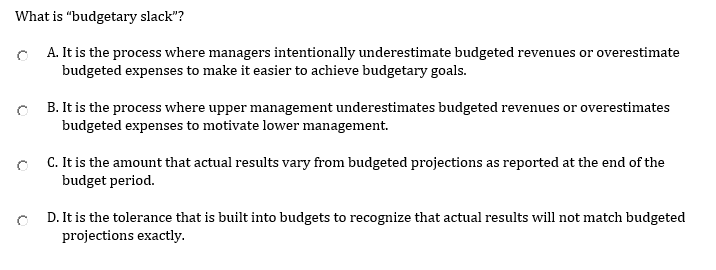
Budgetary Slack: Participation Perspective, Information Asymmetry, and Local Wisdom of Tri Hita Karana
Budgetary Slack Definition

Budgetary slack is an allowance set for any extra expenditure that the entity is going to incur in the fore coming period. This is a practice where an ample amount of intentional allowance is introduced in the budget for any other or miscellaneous expenditure the business is going to sustain. Budgetary Slack is an underestimation of revenue of the organization or over-estimation of expenses of the organization deliberately by the managers or authorized persons so as to achieve higher results than the budgeted estimation to earn the bonus points in the eyes of top management which will be added in performance appraisal and also to earn the good amount of incentives. Budgetary Slack The concept of organizational slack introduced into accounting literature in the 1930s is the harbinger of studies on budgetary slack (Banovic, 2005; Barnard, 1938). Budgetary slack has been defined in several ways. Young (1985, p.831), defines budgetary slack “as the amount by which a subordinate.
A.A. Ketut Jayawarsa, A.A. Sri Purnami and Komang Adi Kurniawan Saputra
Abstract
The participation of budget preparation and information asymmetry has a direct impact on human behavior, such as the occurrence of budgetary slack. The budgetary slack is the reported budget difference with the budget that corresponds to the best estimate for the organization. As for the formulation of the problem is whether the participation of budgeting and information asymmetry affect the budget slack in saving and loan organization North Denpasar and whether tri hita Karana culture can moderate the influence of budgeting participation, and information asymmetry on budget slack in saving and loan organization North Denpasar. This study aims to determine the effect of budgetary participation, and information asymmetry on budget slack with tri hita Karana culture as a moderation variable. This research was conducted at North Denpasar saving and loan organization. The sample used is 19 Savings and Loans organization. Respondents in this study consisted of 2 administrators and 2 supervisors who were involved in preparing the budget in each of North Denpasar saving and loan organization. Data collection was done by interview and questionnaire. The analytical technique used multiple linear regression analysis with Moderated Regression Analysis (MRA). The results showed that the participation of budget preparation had a positive effect on budget slack with a significance value of 0.008. Information asymmetry positively affects the budget slack with a significance value of 0.000. The interaction between budgetary participation and tri hita Karana culture was able to weaken the positive influence of budgetary participation on budget slack with a significance value of 0.045. The interaction of information asymmetry with tri hita Karana culture can weaken the positive influence of information asymmetry on budget slack with a significance value of 0.000.

Volume 12 | Issue 1
Translation and definition 'budgetary slack', Dictionary English-English online. Budgetary slack. Example sentences with 'budgetary slack', translation memory. If this were the case, the countries known for their financial and budgetary slackness would. Budgetary slack increase or decrease depending on the extent to which people care more about themselves or working on behalf of the organization that is the actualization of the level of commitment they have. Commitment shows confidence and strong support of.
Pages: 210-217
DOI: 10.5373/JARDCS/V12I1/20201031
Definition: Budgetary slack is the practice of underestimating revenues or overestimating expenses when preparing a budget in an effort to make it easier to achieve. In other words, it’s a way for management to prepare a budget with built in flexibility that will allow them to meet the budgeted goals easier.
What Does Budgetary Slack Mean?
This is a common practice in many companies that defeats the purpose of the budgeting process. A true budget must be honest and hold management accountable to the overall financial goals of the company. Many times lower-level management and subordinates don’t want to be upheld to these strict standards and budgetary restrictions.
Rather than communicate honestly about the projected revenues and expenses of their departments, they pad their numbers to give them breathing room and circumvent the boundaries of a tight budget.

Example
Budgetary slack can be used for ethical or unethical purposes. For example, if the department is estimated to make $100,000 in sales for the year, the department management might only estimate making $80,000 in sales. By underestimating departmental revenues, the department might be immune to across the board cuts. In this respect it’s a hedge against company wide programs that could unintentionally hurt the department. Although this can mislead the top-level management, it is done to better the company.
On the other hand, if the department purposefully underestimates revenue to mislead top-level management, it can be unethical. For instance, underestimated sales figures are much easier to hit and could result in bonuses for the department that exceeds the estimated numbers.
Budgetary Slack Managers
Whether slack was created in the budget for ethical or unethical reasons, it typically misleads top management to the true profitability of the departments. That’s why it’s important for management to review the prior year’s budget and evaluate the frequency and size of variances between the actual and budgeted numbers. This process might help them correct slack in the current or future budgets.
Budgetary Slack Means
Contents
